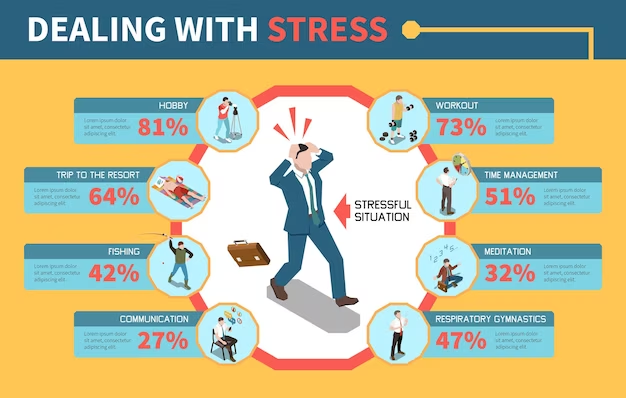Introduction;
Stress is a common experience that affects many individuals in today’s fast-paced and demanding world. Nevertheless, when stress becomes overpowering or persists over time, it can have adverse effects on both our physical and mental well-being. It can occur as a result of various factors and can have a significant impact on one’s mental and physical well-being.
Occurrence of Stress;
– Stress can occur in people of all ages, genders, and backgrounds
– It is a natural response to challenging situations, such as work deadlines, relationship issues, or financial pressures.
– It can be acute, occurring in response to a specific event, or chronic, resulting from ongoing stressors in one’s life
– Specific life stages, such as adolescence, early adulthood, and periods of significant life changes, may be particularly prone to experiencing stress.
Causes ;
-
Work-Related :
- High Workloads and Tight Deadlines
- Job Insecurity
- Conflict with Colleagues or Supervisors
- Lack of Control over Work Tasks
- Long Commutes or Irregular Working Hours
-
Financial :
- Debt and Financial Instability
- Unemployment or Underemployment
- Unexpected Expenses (Medical Bills, Car Repairs, etc.)
- Living Beyond One’s Means
-
Relationship :
- Marital Problems or Conflicts
- Family Issues
- Breakups or Divorces
- Social Isolation or Loneliness
-
Health-Related :
- Chronic Illness or Medical Conditions
- Serious Injuries or Accidents
- Concerns about One’s Own Health or the Health of a Loved One
- Managing a Disability or Caring for a Sick Family Member
-
Academic :
- Academic Pressure and High Expectations
- Exam Anxiety
- Balancing Schoolwork with Extracurricular Activities
- Peer Pressure and Social Challenges
-
Life Transitions:
- Major Life Changes like Moving, Getting Married, Having Children, or Retiring
- Adjusting to New Environments and Routines
- Coping with the Loss of a Loved One
-
Environmental Stressors:
- Natural Disasters (e.g., Earthquakes, Hurricanes)
- Pollution and Environmental Concerns
- Noisy or Crowded Living Conditions
-
Daily Hassles:
- Minor Irritations and Frustrations (e.g., Traffic Jams, Misplaced Keys)
- Time Pressure and Rushing from One Task to Another
- Technology-Related (e.g., Constant Notifications)
-
Trauma and Past Experiences:
- Experiencing or Witnessing Traumatic Events such as Abuse, Violence, Accidents
- Post-Traumatic Stress Disorder (PTSD)
-
Personal Expectations and Perfectionism:
- Setting Unrealistically High Standards for Oneself
- Fear of Failure or Making Mistakes
- Self-Criticism and Negative Self-Talk
-
Lack of Work-Life Balance:
- Difficulty in Balancing Work and Personal Life
- Neglecting Self-Care and Leisure Activities
Signs and Symptoms ;
The signs and symptoms can vary from person to person. Some common signs and symptoms include:
-Mood swings or Feeling overwhelmed or anxious
-Having trouble sleeping
-Feeling tired or fatigued

-Having difficulty concentrating
-Forgetfulness or racing thoughts.
-Feeling irritable or angry
-Having headaches or stomachaches
-Changes in appetite
-Increased use of alcohol and drugs
– Social withdrawal, loss of interest in activities, or decreased productivity.
12 Ways of Managing Stress ;
-
Practice Mindfulness and Meditation:
Engage in mindfulness exercises and meditation to stay present and reduce anxiety.
-
Regular Physical Activity :
Include regular exercise into your routine, as it releases endorphins that aid in alleviating stress.
-
Healthy Diet :
Maintain a balanced diet rich in fruits, vegetables, and whole grains to support overall well-being.
-
Adequate Sleep :
Prioritize getting enough sleep to rejuvenate your body and mind.
-
Time Management :
Organize tasks and set realistic priorities to avoid feeling overwhelmed.
-
Relaxation Techniques :
Explore relaxation methods such as deep breathing, progressive muscle relaxation, or yoga.
-
Social Support :
Lean on friends and family for emotional support and connection.
-
Limit Caffeine and Alcohol :
Reduce the consumption of stimulants like caffeine and alcohol.
-
Hobbies and Leisure Activities :
Engage in hobbies and activities that bring joy and relaxation.
-
Seek Professional Help :
Consult a therapist or counselor for guidance on mental health.
-
Set Realistic Goals :
Establish achievable goals to reduce perfectionism.
-
Time for Self-Care :
Prioritize self-care activities, such as taking baths, reading, or spending time in nature, to recharge.
Keep in mind that effective stress management frequently entails a combination of these strategies customized to your individual needs and circumstances.
Conclusion ;
It is important to note that while stress is a normal part of life, chronic or excessive stress can have negative effects on both physical and mental health. Therefore, it is crucial to recognize the signs and symptoms and take proactive steps to manage and reduce it.
Seeking support from healthcare professionals, therapists, or support groups can be highly beneficial in developing effective management strategies.
Moreover, it’s crucial to recognize that professional assistance is accessible for individuals facing challenges in managing stress independently. Mental health professionals can provide guidance and support in developing healthier ways to cope with it and its associated challenges.
Ultimately, stress is a universal aspect of the human experience, and our response to it can profoundly influence our quality of life. By recognizing its causes, adopting proactive coping strategies, and seeking help when needed, individuals can better navigate the challenges of it and work toward a more balanced and fulfilling life.
Frequently Asked Questions (FAQs);
- What is stress?
- It is the body’s natural response to challenges or threats, triggering a “fight or flight” reaction. It involves a series of physiological and psychological changes to help cope with the perceived danger.
- What are common signs of stress?
- Common signs include increased heart rate, muscle tension, irritability, difficulty concentrating, changes in sleep patterns, and feelings of overwhelm.
- How can I manage stress effectively?
- It involves adopting healthy lifestyle habits, practicing relaxation techniques (such as deep breathing or meditation), exercising regularly, maintaining a balanced diet, and seeking support from friends, family, or professionals.
- Can stress impact physical health?
- Yes, chronic one can contribute to various health issues, including cardiovascular problems, weakened immune function, digestive disorders, and exacerbation of pre-existing conditions.
- Are there different types ?
- It can be categorized into acute (short-term), episodic acute (frequent acute stress), and chronic (long-term). Each type has distinct characteristics and impacts on health.
- How does stress affect mental health?
- Prolonged stress can contribute to mental health issues like anxiety and depression. It may also affect cognitive function, leading to difficulties in decision-making and memory.
- When should I seek professional help for stress?
- If it becomes overwhelming and begins to significantly impact your daily life, it’s advisable to seek help from a mental health professional. Symptoms like persistent anxiety or depression warrant professional attention.
- Can lifestyle changes help reduce stress?
- Yes, adopting a healthy lifestyle can play a crucial role. This includes regular exercise, sufficient sleep, a balanced diet, and incorporating relaxation techniques into your routine.
- What role does mindfulness play in stress management?
- Mindfulness practices, such as meditation and mindfulness-based stress reduction (MBSR), can help individuals become more aware of their thoughts and feelings, promoting a sense of calm.
- Are there specific stress management techniques for the workplace?
- Workplace stress management techniques may include time management, setting realistic goals, effective communication, and creating a supportive work environment.
https://rumble.com/v3boq0m-stress-releif-tips-how-to-coup-with-stress.html








